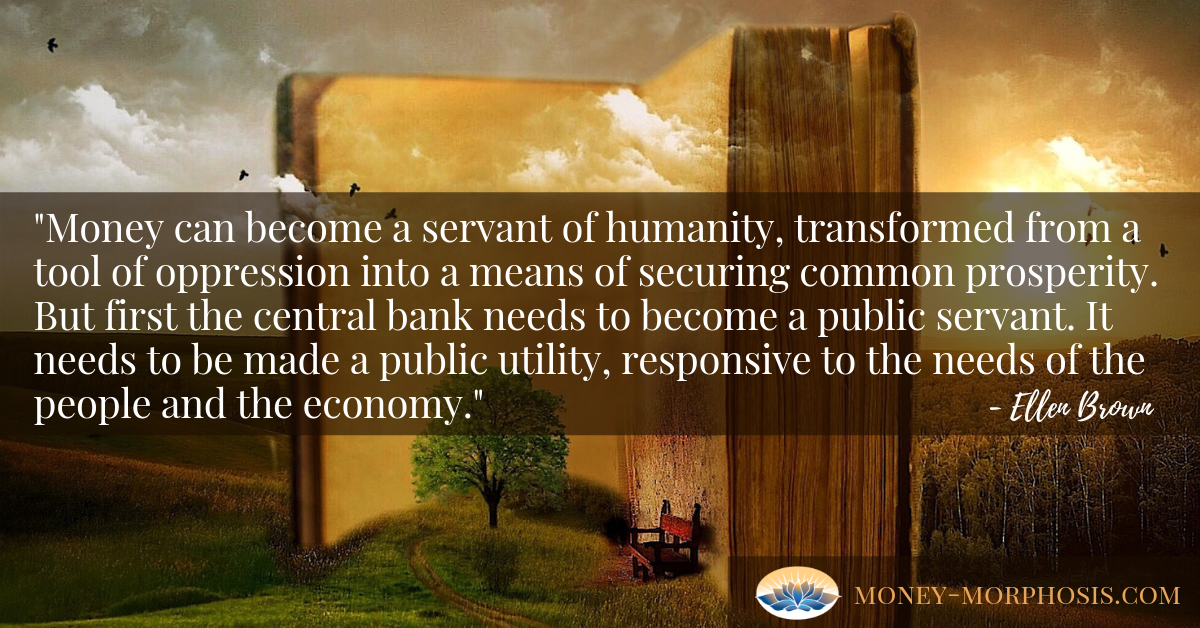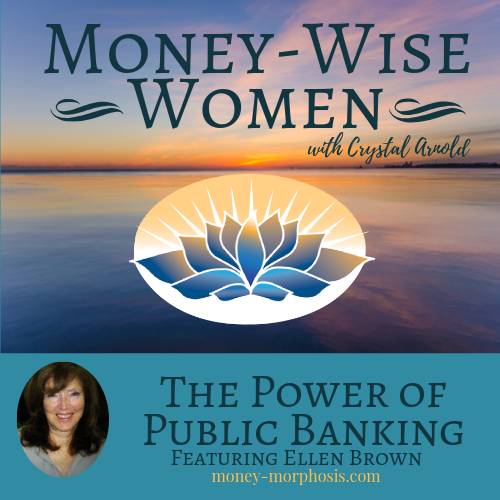In June, we gave a presentation to business students at Southern Oregon University about debt. They were surprised when we described how money comes into circulation as debt with compounding interest owed to private banks. We explained how this design fuels the need for the economic growth that is harming people and planet. It became clear to them that wealth clogging is inevitable—the hoarding and immobilization of value by a privileged few people—unless we change the design of banks, credit, and currency.
Public banking has the power to democratize finance.
“Money-Wise Women” guest Ellen Brown knows this better than anyone. She is an attorney, founder of the Public Banking Institute, and author of thirteen books including Web of Debt and The Public Bank Solution. Her most recent book is Banking on the People: Democratizing Finance in the Digital Age.
Public banking creates financial resilience and offers affordable financing. For a century, the Bank of North Dakota (BND) has been the most successful “public bank” (a bank owned by a state or local government) in America. State tax revenue is deposited in the BND, which funds infrastructure loans for bridges, roads, buses, trains, and solar energy. They also make low-interest loans to students, small businesses, and entrepreneurs. By early 2009, following the banking crisis of 2008, North Dakota was the only state with a major budget surplus. It had the lowest unemployment, foreclosure, and default rates in the country.
Seventy-four groups across the country are actively advocating for public banking, and there are twenty-five active bills. There was a public banking initiative in Los Angeles this last midterm, and the city council got the measure on the ballot in just four months. It got a remarkable 44% of the vote.
Currently, bill AB-857 is moving through the California State Legislature. It would allow towns and cities across the state to charter their own banks. It would not actually establish a public bank at the state level; it would simply provide municipalities with the option to do so.
Public banking gives the people more control and authority over our money supply. It could fund the great work to repair aging infrastructure and frayed social fabric in America, without extracting profits into private banks.

Ellen explains the danger of unsustainable debt and the promise of public banking.
“Worse, defaults on consumer loans were rising. December 2018 was the first time in two years that all loan types and all major metropolitan statistical areas showed a higher default rate month-over-month.
“Quantitative easing has worked to reverse the debts of the banks and to prop up the stock market, but it has not relieved the debts of consumers, businesses, or governments, and it is these debts that will trigger the sort of debt deflation that can take the economy down.
“Money can [through public banking] become a servant of humanity, transformed from a tool of oppression into a means of securing common prosperity. But first the central bank needs to become a public servant. It needs to be made a public utility, responsive to the needs of the people and the economy.”
What about for consumer banking needs? There is also a movement to bring back postal banking, which we had until 1967. Over 139 countries offer some form of financial services through their post offices. The Campaign for Postal Banking is calling for low-cost, consumer-driven products and services that could range from check cashing to bill payment to savings accounts to small-dollar loans.
This will benefit consumers who do not have access to traditional banks. Nearly 28 percent of U.S. households do not have access to affordable financial services. For many, traditional banks are out of reach either geographically or due to high fees and other obstacles to opening and accessing accounts. This lack of access causes about 100 million people to rely on costly, predatory services such as check cashing and payday loans, trapping them in a cycle of debt.
An economy from the heart will have banks designed to serve the people, not to extract value into the pockets of the shareholders of private banks. Because of the nature of our money system, wealth tends to clog. When we change the rules of the financial game, then we bring power to the people and create greater prosperity for all.

Ellen Brown is an attorney, founder of the Public Banking Institute, and author of thirteen books including Web of Debt and The Public Bank Solution. Her most recent book is Banking on the People: Democratizing Finance in the Digital Age. She also co-hosts a radio program on PRN.FM called “It’s Our Money.” Her 300+ blog articles are posted at www.EllenBrown.com.


